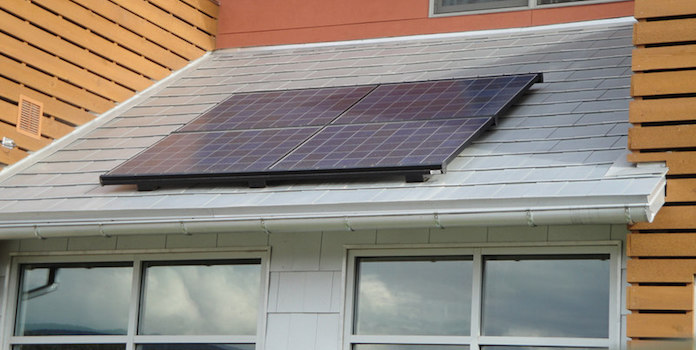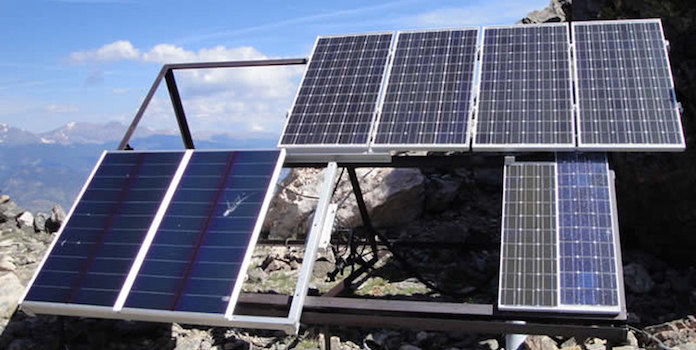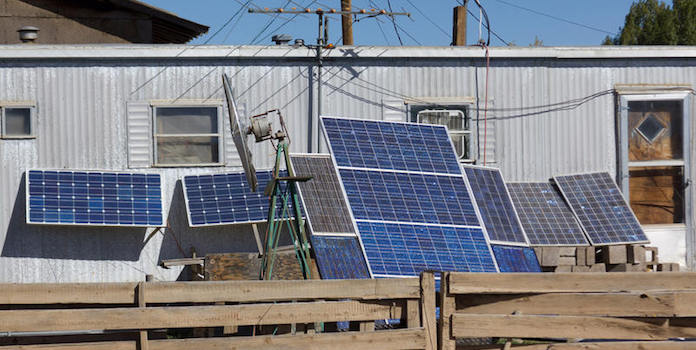Are Used Solar Panels Worth the Hassle?

What must buyers bear in mind when considering second-hand solar panels?
Solar installations can be quite expensive, so we all want to find ways to cut costs. Usually this means simply pricing out the job with several installers or choosing mid-priced equipment. For those of us who are more hands-on, this might even mean buying used solar panels.
While used solar panels are certainly cheaper than new models, there are some serious issues to consider before buying them. You need to assess your project and weigh your options carefully before moving forward.
Let’s take a look at what sort of projects lend themselves to used panels, issues you might come across, and where to buy used solar panels.
When to install used solar panels
Here are a few scenarios where used solar panels might make sense for the right person.
Small DIY projects
If you’re installing a solar panel and battery on your shed to power the lights, buying a small used solar panel makes sense. If it breaks, it’s relatively easy to switch out and you aren’t investing a large amount of money in the project anyway. You can also complete this project yourself, lowering the investment cost even further.
The same goes for RVs or campers. With a small project that is relatively cheap and easy, you can afford to take a chance on a used solar panel that cost half the price of a new one.
Larger solar system, but only if you’re handy
A bigger solar installation is different from the small, one-panel systems above. We’re all for DIY and buying used, but there are many factors to consider – beyond those listed in the section below – before moving forward.
Installing a big solar installation is a lot of work. Are you hiring an installer or doing it yourself? You stand to save a lot of money by tackling it yourself, but you had better be handy and know quite a bit about electricity. You’ll be working with electrical current and you don’t want to kill yourself. I don’t want to sound morose, but death is a real risk if you don’t know what you’re doing.
You could hire an installer, but solar panels only account for about 20% of a typical residential installation’s total cost (pg. v), so buying used panels won’t drop your cost too significantly.
On top of that, do you really want to go through the trouble of finding, purchasing, and installing panels that aren’t covered by warranty or that could have unseen damage?
If you’re confident in your DIY skills and really want to buy used panels, learn more about the issues that could arise in the following section.
Issues with used solar panels
Before you go out and buy used solar panels, consider the following and really evaluate whether it makes sense.
Warranty
Panel manufacturers typically only provide warranties to the original customer, or a new owner only if the panels remain in their original location (in other words, if someone else buys the home with the panels already installed).
If you’re buying used solar panels to put on your home, your panels will likely not be covered by the original warranty. Here’s a quote from the warranty of Yingli Solar, a well-known panel manufacturer:
The Limited Warranty is offered only to the original Customer and any person to whom the title(s) of the Module(s) was transferred, provided that the PV Modules remain installed at the site where they were originally installed.
Yingli Solar
Just so you know the full weight of your decision to buy used, and what you’re giving up, let’s run through exactly what a solar panel warranty covers. Panel manufacturers typically provide two warranties:
- a Product Warranty that guarantees all the panel’s parts will work for a given time, typically around 10 to 15 years.
- a Production Guarantee, an assurance that the panel will produce a certain amount of electricity each year. Most manufacturers guarantee around 80% by Year 20.
Canadian Solar, for example, provides 10-year product warranties and 25-year production warranties, guaranteeing that their solar panels will produce 80.7% of the nameplate rating by Year 25.
Losing this long-term warranty is one of the biggest issues with buying used panels – they’d need to be pretty cheap to be worth not having that kind of peace of mind. If used panels fail for any reason, you’re on the hook to replace them, even for something that should be covered by the manufacturer.
Finding enough of the same panel
If you’re installing more than a single panel or two, you might have issues finding enough of the same panel.
To work at its maximum efficiency, solar installations need to have the exact same solar panels. Over the last 20 years, panel manufacturers have opened, gone out of business, and continually updated their products. This leads to serious difficulty finding matching panels from multiple sources.
If you need 20 solar panels for a large project and find a good deal on Craigslist for 10 of them, don’t just assume you can find more of the same later on! Better to buy all you need at the same time, from the same source.
Damage
This should go without saying, but used products can be damaged. With solar panels, some stuff is easy to check. Is the glass cracked? Are the wires frayed or cut?
Other things, though, are more difficult to check. Is the diode working properly? Are the panels still seeing decent efficiency?
Make a list of everything you need to inspect before you go out and see the panels. Check the glass for hairline fractures. Get your multimeter out and check the voltage and wattage. Is the frame damaged? Does it look like it has been dropped at some point?
Don’t be afraid to take your time and check everything methodically. It might be awkward if the existing owner is standing over you and assuring you that they work perfectly, but it’s worth the extra effort in the long run.
Decreased performance
This is an important one. As solar panels age, they become less efficient, in a process known as degradation. The federally-funded National Renewable Energy Lab found that solar panel efficiency decreases an average of 0.8% annually (p. 6). Obviously, that’s not that much, but over several years it adds up. At this rate, after 10 years, a 250-watt panel will produce about 233 watts. After 20 years, it will only produce about 215 watts.
Before buying any used solar panels, be sure to know the age of the panel and the nameplate wattage (it’ll be printed on the back and is the output the panel started with). Also check the existing wattage (in full sun, of course) to compare to its nameplate rating so you can make sure it’s still functioning well. If you’re buying online, be sure to ask the seller to do the same and upload pictures of the multimeter in action.
Whether or not a used solar panel is a good deal is a matter of cost vs age and performance. Although a used panel will sell for less than a new model, cost must be balanced with performance. If you need to purchase a new panel again in 2 years because its performance is so low, is it worth the hassle and lower initial investment?
On top of that, if you spend a little more upfront for a new (or at least, newer) panel, you could be producing more electricity over those 2 years, thereby seeing a faster return on your investment.
Where to source used solar panels
Where can you buy used solar panels? There’s a surprising amount of options!
Craigslist
People post anything and everything on Craigslist these days, so if you’re set on buying used solar panels, it doesn’t hurt to check your neighborhood listings regularly – you never know what you’ll find. I’ve seen people selling everything from one or two used panels that they no longer need to an entire solar system at an extremely discounted price.
The benefit to Craigslist is that everything is local, so you can easily stop by and inspect the solar panels and other equipment yourself. Don’t forget to bring that multimeter to make sure they are working properly!
On niche items like this (how many people are actually on the market for used solar panels?), Craigslist can be a great way to score a great deal. It also never hurts to haggle a bit!
eBay
You can buy used solar panels on eBay from individuals as well as resellers. Verifying quality and condition are the hardest part of buying on eBay, so make sure everything you need is right in the ad: lots of pictures of the panels and multimeter results, detailed descriptions of the panels (including age and condition), warranty information (whether they are still covered, you never know), etc.
With everyone and their aunt using eBay, getting a great, once-in-a-lifetime deal can be next to impossible. Expect reasonable deals – nothing spectacular.
And don’t forget about shipping costs. If you’re not going to pick them up in person, shipping costs for multiple panels (or even just one) can be quite a doozy!
Oasis Montana
If your local Craigslist isn’t too busy and you can’t find anything on eBay, head over to Oasis Montana, a small renewable energy company in Montana that hosts a surprisingly active classifieds sections on their website where people around the country put their used solar panels and related equipment up for sale.
You can find individual solar panels or small sets, as well as entire solar systems, water pumps, solar hot water systems, and even concentrated PV panels! Pretty cool if you ask us.
What about ‘seconds’?
Seconds are new products that work perfectly but are cosmetically damaged. If you’re looking to save some money going solar, you can find companies selling these either online (like Craigslist) or by just stopping by their office.
Solar panels occasionally get dented or banged up during shipment and companies usually just put these aside when they find one. If they’ve got enough for your needs, they might be willing to cut you a deal.
Of course, this doesn’t happen too frequently, so the hardest part would be simply finding enough panels if you need more than one or two. Also keep in mind that these products may or may not have the full warranty, so you need to check beforehand.
Used solar panels are limited by their very raison d’etre: they’re used goods. They have no warranty, their energy production has possibly degraded, and they could be damaged. You need to keep a wary eye and check condition, age, and energy production before buying.
As such, we’d recommend limiting their use to small projects with low investment. Installing a big solar system on your roof with used solar panels really just isn’t worth the risk and potential hassle to replace them just a few years down the road.
Then again, if you found a really good deal, that’s a different story….



